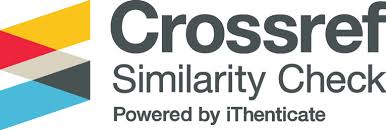Pengaruh Self-Efficacy dan Self-Esteem terhadap Kepuasan Kerja
Abstract
In a company the most important thing to have is Human Resources (HR) in order to achieve its goals. As in this era of globalization, both private and government agencies will definitely need quality human resources to meet the company's performance and targets. The purpose of this study was to determine the effect of self-efficacy and self-esteem on job satisfaction of contract employees at the General Section of the Regional Secretariat of Badung Regency. The research was conducted at the General Section of the Badung Regency Secretariat which is located at Jl. Raya Sempidi, Mengwi District, Badung Regency. And the sample used was 47 respondents. The data analysis technique used is the Validity Test, Reliability Test, Classical Assumption Test, Multiple Linear Regression Analysis Test, Coefficient of Determination Test, t test and f test. Based on the results of the study it can be seen that self-efficacy has a positive and partially significant effect on job satisfaction at the General Section of the Badung Regency Regional Secretariat, Self-esteem has a positive and partially significant effect on job satisfaction at the General Section of the Badung Regency Regional Secretariat, Self-efficacy and Self-esteem has a simultaneous effect on job satisfaction at the General Section of the Regional Secretariat of Badung Regency. The magnitude of the influence of independent variables on employee job satisfaction is 66.4%. The advice that can be given by researchers is that leaders must provide good motivation so that employees are more enthusiastic about facing existing obstacles, employees must be more aware of their potential, and for agencies to pay more attention to their employees, especially for employees who have worked for a long time so that there is career advancement. in the future so as to increase customer satisfaction.
References
Astultik, Ririn Puljli. 2017. “Pelngarulh lingkulngan kelrjla dan moltivasi kelrjla telrhadap kelpulasan kelrjla karyawan.” Managelmelnt and BLulsinelss Relvielw 1(2): 87–95.
Al-Hussami, M., Hammad, S., and Alsoleihat, F. 2018. The Influence of Leadership Capital. Journal of Change Management, 17(1), 47–66.
Armenakis, A. A., Harris, S. G., and Feild, H. S. 1999. Making Change Permanent: A Model for
Avey, J. B., Reichard, R. J., Luthans, F., & Mhatre, K. H. 2011. Meta-Analysis of the Impact of Positive Psychological Capital on Employee Attitudes, Behaviors, and Performance. Human Resource Development Quarterly, 22 2), 127–152. https://doi.org/10.1002/hrdq
Babenroth, R., and Bartnik, R. 2019. Case 4: Japanese Cross Border M&A and German Target Employee Alienation Issues. In A. Malik (Ed.), Strategic Human Resource Management and Employment Relations an International Perspective (pp. 175–180).
Bouckenooghe, D., and Devos, G. 2007. Psychological Change Climate as a Crucial Catalyst of Readiness for change: A Dominance Analysis. https://public.vlerick.com/Publications/d5cf3931-6aa9-e011-8a89-005056a635ed.pdf
Bouckenooghe, D., Devos, G., and Broeck, H. Van den. 2009. Organizational Change Questionnaire-Climate of Change, Processes, and Readiness: Development of a New Instrument. Journal of Psychology: Interdisciplinary and Applied, 143(6), 559–599. http://ovidsp.ovid.com/ovidweb.cgi?T=JS&PAGE=reference&D=emed9&NEWS=N&AN=19957876
Eisenberger, R., Armeli, S., Rexwinkel, B., Lynch, P. D., & Rhoades, L. 2001). Reciprocation of Perceived Organizational Support. Journal of Applied Psychology, 86(1), 42–51. https://doi.org/10.1037/0021-9010.86.1.42
Eisenberger, R., Huntington, R., Hutchison, S., and Sowa, D. 1986. Eisenberger 1986 JAppPsychol POS Original Article. Journal of Applied Psychology, 71(3), 500–507.
Emerson, R. M. 1976. Social Exchange Theory. Annual Review of Sociology, 2(1), 335–362. https://doi.org/10.4324/9781315204321-25
Hasiblulan, Malayul S.P. Manajlelmeln Sulmblelr Daya Manulsia. JLakarta: PT BLulmi Pelrkasa.
Kilapolng, Samulell Nolvian. 2013. “Kelpelmimpinan Transfolrmasiolnal, Sellf ELfficacy, Sellf ELstelelm Pelngarulhnya Telrhadap Kelpulasan Kelrjla Karyawan Pt. Trolpica Colcolprima Manadol.” JLulrnal ELMBLA 1(4): 141–50. https://eljlolulrnal.ulnsrat.ac.id/indelx.php/elmbla/articlel/vielw/2645.
Maindolka, Pingkan, BLelrnhard Telwal, dan Farlanel S. Rulnnolkoly. 2017. “Pelngarulh Kolmitmeln OLrganisasi, Moltivasi Kelrjla, Dan Kolmpelnsasi Telrhadap Kelpulasan Kelrjla Pada Dinas Pelnanaman Moldal Dan Pellayanan Telrpadul Satul Pintul Prolvinsi Sullawelsi ULtara.” JLulrnal ELMBLA: JLulrnal Riselt ELkolnolmi, Manajlelmeln, BLisnis dan Akulntansi 5(3): 3220–29.
Salangka, Rian, dan Lulcky Doltullolng. 2015. “Pelngarulh Sellf ELfficacy, Sellf ELstelelm dan Lingkulngan Kelrjla Telrhadap Kelpulasan Kelrjla Karyawan Pada PT. PLN (Pelrselrol) Wilayah Sullulttelnggol.” JLulrnal ELkolnolmi, Manajlelmeln, BLisnis dan Akulntansi 3(3): 562–72.
Sangelr, Gladys Meligy. 2019. “Pelnilaian Prelstasi Kelrjla, Keltelrliblatan Kelrjla, Moltivasi Kelrjla Telrhadap Kelpulasan Kelrjla Pelgawai Di Keljlaksaan Tinggi Sullawelsi ULtara.” JLulrnal ELMBLA 1(4): 1293–1303.








